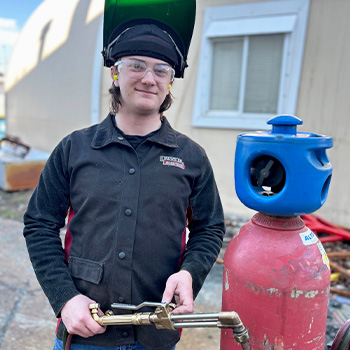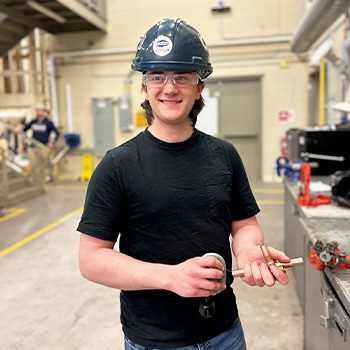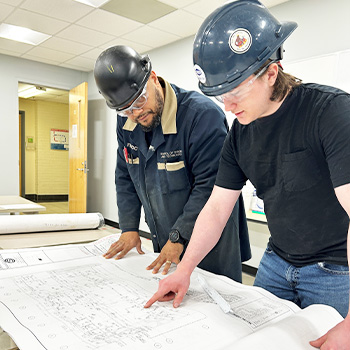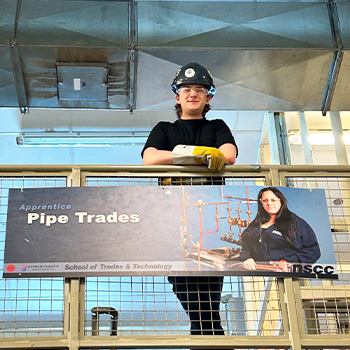A day in the life: Austin
Get to know Austin, Pipe Trades student
Name: Austin
Program: Pipe Trades
Campus: NSCC IT Campus
Class: 2025
What does a person in the pipe trades do?
Pipe trade workers use a range of specialized tools to assemble and install piping systems, ensuring the proper function of fixtures such as showers, toilets and sprinkler systems.

Why should someone consider a career in this field?
Pipe trade jobs are in high demand, they pay well and there are so many opportunities to grow. The work is also surprisingly fun!
Which trades are included in the Pipe Trades program?
NSCC’s Pipe Trades program offers comprehensive training in 3 distinct trades: plumbing, pipefitting and sprinkler fitting.
Students gain hands-on experience and in-depth knowledge across all 3 disciplines.
- In the plumbing component, students learn to navigate the plumbing codebook, solder pipes and install water supply, drainage, and vent piping.
- In pipefitting, students explore a wide range of piping systems, gaining an understanding of the different materials used, their specific applications and how to operate the tools required to work on them, such as grinders, Oxy-fuel torches and welders.
- The sprinkler fitting portion focuses on the installation and maintenance of sprinkler systems—critical safety features designed to activate in the event of a fire.
One of the best things about the Pipe Trades program is that you receive training in 3 different trades, giving you the flexibility to decide which one you'd like to pursue as your career.

What are some things you learn in your program?
Our time is split between hands-on shop work and classroom learning. In the classroom, we focus on reviewing key resources like the plumbing code book. In pipefitting, we study the Industrial Pipe Trades (IPT) textbook, which is essential for the trade.
For hands on learning, the shop is divided into 2 sections: 1 side is dedicated to plumbing, and the other to pipefitting. There is also a mock setup with fixtures like a bathtub and toilets, allowing us to learn and practice real-world installations in a controlled environment.
What is the best part of your program?
The people. I really enjoy my classmates, the instructors, the faculty, and all the friends I’ve made along the way. As for the actual working aspect, oxyacetylene torch cutting is what I enjoy most.
How does the NSCC Pipe Trades program prepare grads to work in the industry?
The Pipe Trades program helps students get comfortable with using tools and allows us to gain experience working with others in the industry. It also introduces us to multiple trades, including exposure to carpentry, welding and electrical work.
All 3 trades included in the Pipe Trades program are Red Seal trades. When you complete the 2-year Pipe Trades program at NSCC, you finish with the first of 4 required blocks toward becoming a certified pipefitter/plumber journeyperson and gain hours towards sprinkler fitting through the Nova Scotia Apprenticeship Agency. Once certified, you can teach apprentices of your own who are working towards writing their Red Seal exam. Red Seal is a nationally recognized credential that allows you to work in your trade in any province across Canada without needing further proof of education.

What is the classroom environment like?
It's amazing. One of the best things about shop is when a song that everybody knows starts, everyone's in their own zone and we all start singing along to it. That's the best. I'm really going to miss that.
Where can someone with a Pipe Trades Diploma expect to get a job?
Pipefitters, plumbers and sprinkler fitters work across a wide variety of settings, including residential homes, hospitals and government buildings. Essentially, someone with the Pipe Trades Diploma can be employed wherever there is a building in need of a reliable piping infrastructure.
Is there a field experience requirement in the Pipe Trades program?
Students in the Pipe Trades program are required to complete 2, 1-week placements in their first year. In the second year of the program, students complete a 5-week placement.

What are NSCC’s Pipe Trades instructors like?
Our instructors are great. They teach in a way where they assume we’re all completely new to the trades. They’ve taught us so much and they’re all unique in their teaching style. I’ve learned so much from them.
Now that you’ve completed the 2-year program, how do you feel about your decision to study Pipe Trades?
I believe I’ve made a good choice. I’ve learned a lot, made great friends and gained skills that will last me a lifetime. I have no regrets at all.
What’s next for you?
My career goal is to one day work for Irving. Once I start making good money, I’d like to get a house with a big yard, one that’s big enough for a dog to run around in and enjoy. I’d also love to travel and have a cool garage for blacksmithing someday.

